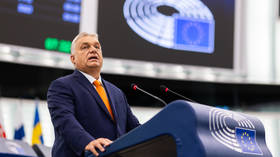The ministry has renamed its Department of European Cooperation amid deteriorating ties with the EU
The Russian Foreign Ministry has rebranded its Department of European Cooperation (DEC) into the Department of European Problems (DEP), according to its website.
The relevant changes to the structural diagram on the ministry’s page were made earlier this week and Russian media reported them on Saturday.
Despite the word “cooperation” being replaced with the word “problems” in the department’s title, the DEP will keep executing the same functions as before. Its task has been dealing with the “issues of international European organizations” such as the OSCE (Organization for Security and Co-operation in Europe), the Council of Europe, the EU and NATO.
The name of the department has only been changed in the Russian version of the website. For now it is still called the ‘Department of European Cooperation’ in the English, French and German versions.
Moscow’s relations with European organizations have been problematic since 2014 when Crimea overwhelmingly voted in a referendum to reunite with Russia. They deteriorated even further after the escalation of the conflict with Ukraine in February 2022, in which the EU has been supporting Kiev with weapons and funds.
Moscow said in August that the OSCE was in “a crisis situation” due to the inability of its member-states to find common ground on the most basic issues. Last year, Russia withdrew from the Council of Europe, insisting that the organization had been hijacked by the West in order to promote its interests. Russia also considers EU nations to be “unfriendly” countries, while viewing NATO as a hostile military bloc.
During his meeting with Hungarian Prime Minister Viktor Orban in July, Russian President Vladimir Putin described the state of relations between Moscow and the EU as being “at its lowest point.”
Last year, Russian Foreign Minister Sergey Lavrov said that “the EU ‘lost’ Russia. But it is its own fault. After all, it is the EU member states and the leaders of the bloc, who openly declare the need to inflict, as they say, a strategic defeat on Russia.”
The EU nations are currently not ready to talk to Moscow, Lavrov said. Cooperation with the bloc can only resume if it happens on an equal basis and takes Russian interests into account, he added.

 1 month ago
7
1 month ago
7










 English (US) ·
English (US) ·